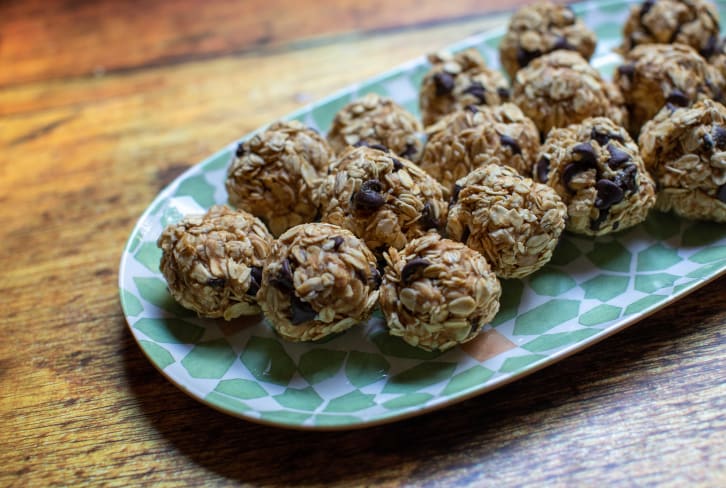Advertisement
Goat Milk vs. Cow Milk: Which One Is Healthier?

Plant-based milks, like oat, nut, and pea protein have become popular alternatives to cow's milk. But for those who prefer and can tolerate dairy, is cow milk the best option? Or should people keep goat milk on their radar?
To compare the benefits and drawbacks of cow and goat milk, mbg spoke with registered dietitians. Here's what they have to say about the two dairy drinks.
Cow and goat milk benefits.
Because they're animal products, cow and goat milk are both complete proteins. In other words, they contain all nine essential amino acids necessary for energy production, tissue repair, and muscle building.
Both goat and cow milk are also naturally high in calcium, unlike most alt-milks, which require fortified nutrients to compare. "Both types of milk provide about one-third of our daily needs for calcium," registered dietitian and spokesperson for the Academy of Nutrition and Dietetics Julie Stefanski, MEd, RDN, tells mbg. "Few other foods provide this benefit."
Each dairy beverage is high in vitamins A and D, as well as minerals, like magnesium, phosphorus, and potassium.
"In terms of nutrients, you can swap out cow's milk for goat's milk easily," registered dietitian Frances Largeman-Roth, RDN, says. "You can also find goat milk cheese, yogurt, and powdered milk."
Cow milk nutrition
These are the standard nutrients for 1 cup of whole cow's milk1, according to the U.S. Department of Agriculture (USDA):
- Calories: 149
- Fat: 7.93 g
- Sodium: 105 mg
- Carbohydrates: 11.7 g
- Sugar: 12.3 g
- Protein: 7.69 g
- Calcium: 276 mg
- Magnesium: 24.4 mg
- Phosphorus: 205 mg
- Potassium: 322 mg
Goat milk nutrition
These are the standard nutrients for 1 cup of whole goat's milk2, according to the USDA:
- Calories: 168
- Fat: 10.1 g
- Sodium: 122 mg
- Carbohydrates: 10.9 g
- Sugar: 10.9 g
- Protein: 8.69 g
- Calcium: 327 mg
- Magnesium: 34.2 mg
- Phosphorus: 271 mg
- Potassium: 498 mg
How are cow and goat milk different?
Nutritionally, goat milk is slightly higher in fat and calories, but also contains more vitamins, minerals, and protein than cow's milk.
They differ more significantly in terms of taste. "While cow's milk is fairly neutral, goat's milk has a distinctive 'farmy' flavor that can take some getting used to," Largeman-Roth says. "You may want to introduce it to kids in a smoothie versus a glass of milk."
Goat milk may also be easier to digest than cow's milk because of the size of the fat globules. "While the amount of total fat is the same," Largeman-Roth explains, "the size of the fat globules in goat's milk are smaller than those in cow's milk and are easier for the digestive system to handle."
Goat milk is also slightly lower in natural sugars (aka lactose), which may make it easier to digest for people with a lactose intolerance.
Which one is healthier?
"Compared to cow's milk, goat's milk has higher amounts of vitamin A, riboflavin, calcium, potassium, and niacin," Stefanski says. It's also easier to digest because of the small fat globules and slightly lower lactose content.
While goat milk may be beneficial for adults, Stefanski says it's not necessarily better for babies. Before an infant turns 1, they should only drink breast milk or formula. After that, however, she says if a child has an allergy to cow's milk, they'll also most likely be intolerant to goat's milk, buffalo milk, or camel's milk. In this case, the child may benefit more from fortified plant-based milks.
Watch Next
Enjoy some of our favorite clips from classes
Enjoy some of our favorite clips from classes
What Is Meditation?
Mindfulness/Spirituality | Light Watkins
Box Breathing
Mindfulness/Spirituality | Gwen Dittmar
What Breathwork Can Address
Mindfulness/Spirituality | Gwen Dittmar
The 8 Limbs of Yoga - What is Asana?
Yoga | Caley Alyssa
Two Standing Postures to Open Up Tight Hips
Yoga | Caley Alyssa
How Plants Can Optimize Athletic Performance
Nutrition | Rich Roll
What to Eat Before a Workout
Nutrition | Rich Roll
How Ayurveda Helps Us Navigate Modern Life
Nutrition | Sahara Rose
Messages About Love & Relationships
Love & Relationships | Esther Perel
Love Languages
Love & Relationships | Esther Perel
What Is Meditation?
Box Breathing
What Breathwork Can Address
The 8 Limbs of Yoga - What is Asana?
Two Standing Postures to Open Up Tight Hips
How Plants Can Optimize Athletic Performance
What to Eat Before a Workout
How Ayurveda Helps Us Navigate Modern Life
Messages About Love & Relationships
Love Languages
Advertisement

These Peanut Butter Cup Protein Bites Make The Perfect On-The-Go Snack
Molly Knudsen, M.S., RDN










